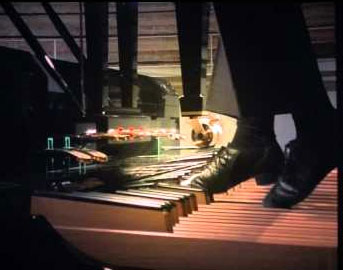VIDEO
|
Roberto
PROSSEDA

Late Piano
Works
|


|
Rondo D-Dur, K 485
 youtube
youtube
 Menuett D-Dur,
Menuett D-Dur,
K 355/576b
|
Roberto
PROSSEDA

Complete Piano Variations
|
|
Chanson
"Ah, vous dirai-je, maman"
KV 265
 youtube
youtube
|
Ch. W. Gluck
"Unser dummer Pöbel
meint"
Allegro
 youtube
youtube
|
Dezède
"Lison dormait"
Allegro - Cadenza
 youtube
youtube
|
|
|
|
|
|
Roberto
PROSSEDA

Piano Works
|
|
|
 |
"Indagine su un cittadino al di sopra sospetto" / Ermittlungern
gegen eine über jeden Verdacht erhabenen Bürger
 youtube youtube
Morricones
Klavier-Fassung eines Themas aus einer seiner bekannten
Filmmusiken
|
|
|
|

Video
Clip
|

|
 Funeral March of a Marionet
Funeral March of a Marionet
Clip zur
Gounods legandärem Stück " Marche fuinèbre d'une
Marionette"
|
|
|
|
Roberto
PROSSEDA
Live in concert
Orquestra de la
Comm.de Madrid./ V.P. PerezD. Madrid, 27.12.19
|

|
Charles
Gounod
 Konzert f. Pedalflügel & Orchester Konzert f. Pedalflügel & Orchester
|
|
|
|
Enescu
Philh.Orch./ D. Gimenez
Bucarest, Feb 2018
|

|
Felix
Mendelssohn
 Klavierkonzert
Nr.1, Op.25 Klavierkonzert
Nr.1, Op.25
|
|
|
|
Orq. Sinf. de
Galicia/ V.P. Perez
La Coruna, May 2018
|

|
Felix
Mendelssohn
 Klavierkonzert
Nr.2, Op.40 Klavierkonzert
Nr.2, Op.40
|
|
|
|
Orch.
I
Virtuosi Italiani
Piano recital
Live
in Lodi 2018
|

|
W.A. Mozart
 Piano Concert KV 271, Piano Concert KV 271,
3rd
mov
F. Mendelssohn
 Variations sérieuses,
d-moll, op. 54
Variations sérieuses,
d-moll, op. 54
|
|
|
|
Pedal Piano Recital
Live in Pordenone
|

|
J.S. Bach
 Passacaglia , c-moll, BWV 582, KV
60 Passacaglia , c-moll, BWV 582, KV
60
|
|
|
|
Documentary / Interview
Video London Philh. Orch.
Konzert
am 14.11.2018
|

|

Upon the Pedal Piano

History and Characteristics. Mechanic
Musical Features
|
|
Luca
LOMBARDI
Chamber Music
|

|
 Infra Infra
Live-recording
ensemble
unitedberlin
|
 "Warum" "Warum"
Live-recoding
Israeli Contemporary
String Quartet
|
|
Jean Jacques
LEMETRE
Interview
|

|
Music
from 5
Continents
Lemêtre in his atelier
Excerpt
from from theseries: "Amazing Human Beings"
|
|
DVD
|
|
Roberto PROSSEDA
DVD
Pedalflügel Recital
|

|
Ch.V. Alkan
 Grand Prélude op.66, n.4 pour piano pédalier, Grand Prélude op.66, n.4 pour piano pédalier,
|
|
Jean Jacques
LEMETRE
DVD
|

|
 L'oeil et l'oreille L'oeil et l'oreille
4 films d'Anne Lacombe
Sur le travail et
la musique
de Jean Jacques Lemêtre
|
|
|
|
| AUDIO |
Luca
LOMBARDI
"Sarah & Hagar"
f. 2 Soprane & Sinfonieorchester
|
 Introduktion
Introduktion
 Ausschnitt
2.Teil
Ausschnitt
2.Teil
 Finale Finale
Uraufführung, 29.5.2019
Düsseldorfer Symphoniker/F.
Bloch
Marisol Montalvo & Eir
Inderhaug
|

|
"Josquin
Desprez & Leonardo da Vinci in Berlin"
f. Chamber Ensemble
|
 Beginning sequence
Beginning sequence
World Prmiere, 28.6.2021
wirh ensemble unitedberlin
|

|
|
Shlomo
MINTZ
&
Roberto
PROSSEDA
Mendelssohn
Concert f. violin & piano
|
 2.mov, Adagio
2.mov, Adagio
 3.mov,
Allegro Molto
3.mov,
Allegro Molto
Flanders Symph. Orchestra, Jan Latham-Koenig
|

|
|
Roberto
PROSSEDA
Mozart
Piano
Sonatas 13 - 18
|
 Sonate Nr.14 in c-moll, KV 457, Molto
Allegro Sonate Nr.14 in c-moll, KV 457, Molto
Allegro
 Sonate Nr.18 in D-Dur, KV 576, Allegretto Sonate Nr.18 in D-Dur, KV 576, Allegretto
 Sonate Nr.18 in D-Dur, KV 576, Adagio Sonate Nr.18 in D-Dur, KV 576, Adagio
 Sonate Nr.17 in B-Dur, KV 570, Adagio Sonate Nr.17 in B-Dur, KV 570, Adagio
|

|
Mozart
Piano
Sonatas 7-12
|
 Sonate Nr.7 in C, KV 309, Rondeau
Allegretto Gracioso
Sonate Nr.7 in C, KV 309, Rondeau
Allegretto Gracioso
 Sonate Nr.10 in D, KV 330, Andante
Cantabile Sonate Nr.10 in D, KV 330, Andante
Cantabile
 Sonate Nr.9 in D, KV 310, Presto Sonate Nr.9 in D, KV 310, Presto
 Sonate
Nr.11 in D, KV 331, Andante Gracioso
Sonate
Nr.11 in D, KV 331, Andante Gracioso
|

|
Mendelssohn
Piano
concerts
1 + 2
|
 Nr.1,
Op.25, 1.mov,
Nr.1,
Op.25, 1.mov,
Molto
Allegro
 Nr.2,
Op.40, 2.mov,
Nr.2,
Op.40, 2.mov,
Adagio
Residentie Orkest, Jan Willem de Vriend
|
|
Gounod
Klavierwerke
|
 Marche Funèbre d'une Marionette,
d-moll, CG 583 Marche Funèbre d'une Marionette,
d-moll, CG 583
 Méditation sur le 1er Prélude de Bach,
C-Dur, CG 896
Méditation sur le 1er Prélude de Bach,
C-Dur, CG 896
 La Veneziana (Barcarolle), g-moll, CG
593
La Veneziana (Barcarolle), g-moll, CG
593
|

|
|
|
|
 3.Satz
"Wilder
Reiter" * 5.Satz
"Scherzo (SHoA2)" *
3.Satz
"Wilder
Reiter" * 5.Satz
"Scherzo (SHoA2)" *
7.Satz
"SHAlom"
Live-recording
2006, Nomos Quartett
|
 |
|
Concerto per Flauto
|
 2.Satz 2.Satz
Live-recording
2010, E.Pahud, flute ,
Kansas City Orch., M. Stern
|

|
Terra + Mare" |
 Terra Terra
Liverecording Orchestra del Maggio Musicale Fiorentini
Zubin Mehta
|

|
CD "Music for solo flute"
|
 Nel vento, con Ariel Nel vento, con Ariel
Roberto
Fabbricciani, flute
|

|
|
"Mendelssohn in the Jewish Museum
Berlin"
|
 Live -recording 2016, Roberto Prosseda,
piano Live -recording 2016, Roberto Prosseda,
piano |
 |
INTERVIEWS & TEXTS
|
Roberto
PROSSEDA
|

|
 Making
music in the 21st century Making
music in the 21st century
Februar
2019,
Yale School of Music
 Music
of my life Music
of my life
Juni
2018, Piano
International
w. J. Nichols
 Neues von Mendelssohn
Neues von Mendelssohn
Mai
2018, Pianist Magazine 2/18
|
|
Günter A.
BUCHWALD
Interview
|

|
 Silent Movie & Live Music Silent Movie & Live Music
|
|
Jean Jacques
LEMETRE
Book |

|
 JOUER AVEC LA MUSIQUE
JOUER AVEC LA MUSIQUE
JJ Lemêtre et le Théâtre du soleil
Pierre Longuenesse
Actes
SUD-Papiers
|
|
Luca
LOMBARDI
Talks
|

|
 Upon his work Upon his work
Rom, 2013
with W.Korb
|
|
|
|
Essai
|

|

|

|

|
Faust
Un Travestimento
|
Dmitri oder
Der Künstler und
die Macht
|
Prospero
|
Il Re Nudo
|
|
 Horror,
Traumspiel, Horror,
Traumspiel,
Märchenbuffa
Upon the opera composer Opernkomponisten
Luca Lombardi
Gerhard R. Koch
Musik-Konzepte 2014
|
|

|

